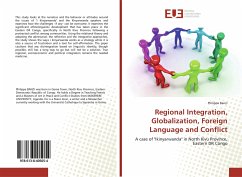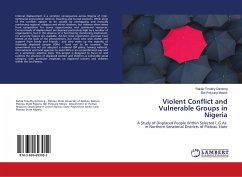This study looks at the narrative and the behavior or attitudes around the issues of "i Kinyarwanda" and the Kinyarwanda speakers and examines how the challenges -if any- can be overcome. It examines the significant ethnolinguistic development that has taken place in the Eastern DR Congo, specifically in North Kivu Province following a protracted conflict among communities. Using the relational theory and adopting the adversarial, the reflective and the integrative approaches, the study shows the ways i kinyarwanda works as a strategy while it is also a source of frustration and a tool for self-affirmation. The paper cautions that any disintegration based on linguistic identity, though possible, still has a long way to go but will not be a solution. True regional, socioeconomic and political integration remains the needed medicine.
Bitte wählen Sie Ihr Anliegen aus.
Rechnungen
Retourenschein anfordern
Bestellstatus
Storno








